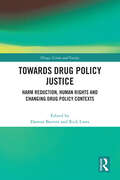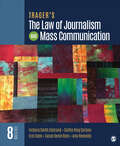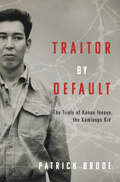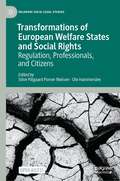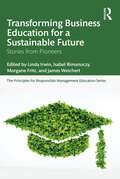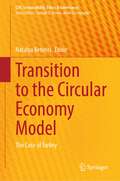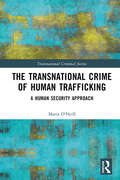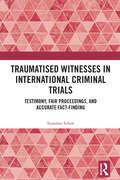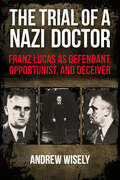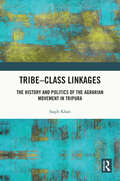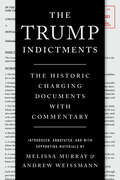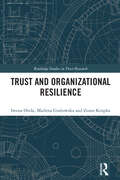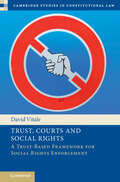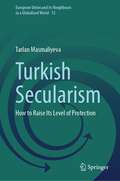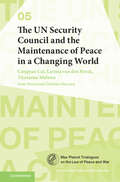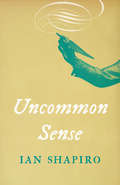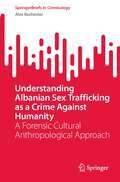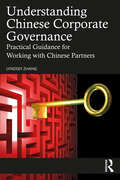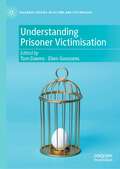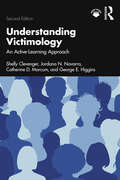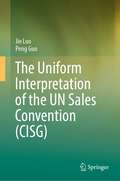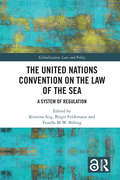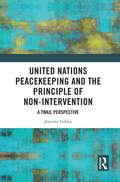- Table View
- List View
Towards Drug Policy Justice: Harm Reduction, Human Rights and Changing Drug Policy Contexts (Drugs, Crime and Society)
by Barrett, Edited by Damon Rick LinesTaking the shifting global drug policy terrain as a starting point, this collection moves beyond debates about whether to reform drug policies to a focus on delivering ‘drug policy justice’ – repairing the damage caused by the war on drugs as a component of reform efforts and safeguarding against future harms in legal markets. This book brings together some of the leading international thinkers and advocates on harm reduction and drug policy to introduce key questions in contemporary drug policy. Across five themes, and with contributions from different regions and disciplines, it explores ethical, legal, empirical and historical perspectives on delivering ‘drug policy justice’ from supply through to use. Essays cover a wide range of issues, from the effects of COVID on drug policy to securing economic and environmental justice, and from human rights in Asian drug policy to questions of race and equity in cannabis reforms, providing diverse insights on both prominent and overlooked drug policy challenges. Towards Drug Policy Justice is a benchmark text for scholars, students, advocates and policymakers as the book explores new models of global drug policy reform.
Trager′s The Law of Journalism and Mass Communication
by Victoria Smith Ekstrand Caitlin Ring Carlson Erin Coyle Susan D. Ross Amy ReynoldsTrager′s The Law of Journalism and Mass Communication provides a clear and engaging introduction to media law with comprehensive coverage and analysis for future journalists and media professionals. Grounded in the traditions and rules of law, along with fresh facts and examples, the authors demonstrate how the law functions in everyday life. The Eighth Edition of this bestselling text offers students a new breadth and diversity of material and brings the law to life with cutting-edge research, the latest court and legislative rulings, and a wealth of new content. Included with this title: LMS Cartridge: Import this title′s instructor resources into your school′s learning management system (LMS) and save time. Don′t use an LMS? You can still access all of the same online resources for this title via the password-protected Instructor Resource Site. Learn more.
Trager′s The Law of Journalism and Mass Communication
by Victoria Smith Ekstrand Caitlin Ring Carlson Erin Coyle Susan D. Ross Amy ReynoldsTrager′s The Law of Journalism and Mass Communication provides a clear and engaging introduction to media law with comprehensive coverage and analysis for future journalists and media professionals. Grounded in the traditions and rules of law, along with fresh facts and examples, the authors demonstrate how the law functions in everyday life. The Eighth Edition of this bestselling text offers students a new breadth and diversity of material and brings the law to life with cutting-edge research, the latest court and legislative rulings, and a wealth of new content. Included with this title: LMS Cartridge: Import this title′s instructor resources into your school′s learning management system (LMS) and save time. Don′t use an LMS? You can still access all of the same online resources for this title via the password-protected Instructor Resource Site. Learn more.
Traitor By Default: The Trials of Kanao Inouye, the Kamloops Kid
by Patrick BrodeAt the end of World War II, a young Japanese Canadian would stand trial and face execution for having committed war crimes and betraying his country.One of the most bizarre stories to emerge at the end of the Second World War was that of Kanao Inouye. Born in Kamloops, B.C., in 1916, he had relocated to his ancestral homeland of Japan, and by 1942 was a translator for the Japanese army. He was assigned to the prisoner of war camp in Hong Kong where he became infamous as one of the “most sadistic guards” over the Canadian survivors of the Battle of Hong Kong. Scores of prisoners would attest to his brutality administered in revenge for the treatment he had received growing up in Canada.His reputation was such that he was quickly apprehended after the war and faced charges of war crimes. But his subsequent trials became mired in questions as to who he really was. Was he a Canadian forced to serve in the Japanese military machine? Or was he a devoted soldier of his emperor obeying his superiors?
Transformations of European Welfare States and Social Rights: Regulation, Professionals, and Citizens (Palgrave Socio-Legal Studies)
by Stine Piilgaard Porner Nielsen Ole HammerslevThis open access edited book investigates European social rights in practice from socio-legal perspectives. It brings together fourteen socio-legal scholars, representing Nordic and Western European countries, who analyse different aspects pertaining to European social rights, namely the regulation of social rights, encounters between welfare professionals and citizens, and citizens’ mobilisation of social rights. These three different aspects from the structure for the sections in the anthology, each analysing transformations related to regulation, encounters and rights mobilisation. The book contributes to the existing literature as it focuses on interdependent transformations on macro, meso and micro levels which are key for understanding processes and contexts related to European social rights in practice. It speaks particularly to academics in sociology of law and/or regulation.
Transforming Business Education for a Sustainable Future: Stories from Pioneers (The Principles for Responsible Management Education Series)
by Linda Irwin Isabel Rimanoczy Morgane Fritz James WeichertAs the impact of climate change becomes more evident and dire, business leaders, educators, students, and academic leaders are deciding what they need to change and do to survive and thrive in a new and dramatically different environment. This book sets out how to transform business education and integrate sustainability practices into curriculum and a wider academic culture. While some universities around the globe are still teaching business practices that have contributed to human and environmental crises, pioneering educators and higher education institutions are researching, developing, and implementing programs to transform business education and practices. With stories from 26 administrators, researchers, and faculty across the globe, this book inspires business educators with innovative tools and creative solutions to address challenges in the business world and society. These pioneers are helping students and business ventures change the way they conduct business to survive and thrive in a fast-changing global environment. Their unique and personal journeys offer tools, models, lessons-learned, and inspiration for change. The book will both inspire and guide faculty members, administrators, students, and alumni to transform business education for a sustainable future.
Transition to the Circular Economy Model: The Case of Turkey (CSR, Sustainability, Ethics & Governance)
by Natalya KetenciThis edited volume provides a multisectoral, multidisciplinary analysis of the circular economy in Turkey. The chapters delve into different segments of the economy, monitoring the progress of the transition to circularity as it is occurring. Written by experts in the circular economy, chapters touch on different aspects of the sustainability transition—from AI and entrepreneurship to luxury fashion to green finance. Chapters also refer directly to applicable UN Sustainable Development Goals, noting the progress made towards related development targets. This volume will be of use to students, academicians, experts, and professionals interested and working on different aspects of circular and green economies.
The Transnational Crime of Human Trafficking: A Human Security Approach (Transnational Criminal Justice)
by Maria O'NeillHuman trafficking is a multi-faceted crime. It suffers from definitional and implementation problems. One facet, the focus of this book, is the transnational nature of much of the crime, and the need for practitioners to operate across borders to combat it. Europe has taken a distinctive approach to cross border law enforcement and judicial cooperation, which could be used as a model in other areas of the world. This publication examines these problems from a Council of Europe and European Union perspective, including the now post-Brexit UK. The UK has adopted a distinctive approach to legislating and operationalising its trafficking in human beings (THB) legal frameworks, also legislating for “slavery, servitude, forced and compulsory labour”, resulting in distinctive results in internal UK law enforcement. It is argued here that this approach and the results should inform THB legislative and operational developments more widely. Further action in legal and operational frameworks is, however, clearly needed and the book advocates the adoption of a human security “freedom from fear” approach. Ultimately, the interaction of different legal frameworks, and different jurisdictions requires transnational practitioners to adopt a constructivist approach, as was adopted for the development of the internal EU area of freedom, security and justice. The book will be of interest to academics, researchers and policy-makers working in the areas of transnational law, migration law, criminology and international relations.
Traumatised Witnesses in International Criminal Trials: Testimony, Fair Proceedings, and Accurate Fact-Finding
by Suzanne SchotThis book focuses on the testimonial evidence of traumatised witnesses in trials of international crimes, which deal with acts of genocide, war crimes and crimes against humanity. Such trials often involve the testimonies of those who experienced or witnessed extremely traumatic events, which can make it hard for these witnesses to recall specific details. Testifying during trial may in itself also pose challenges to their well-being. Yet the legal process of determining whether someone can be held criminally responsible for the alleged crimes needs to be fair, in accordance with the right to a fair trial of the accused, and the facts need to be determined as accurately as possible. This book argues that to ensure fair and accurate fact-finding when in particular traumatised witnesses testify, a balance needs to be struck between the needs of witnesses who testify about traumatic experiences, the fair trial rights of the accused and the objective of the court to establish as accurately as possible the responsibility of the accused. This is crucial throughout the stages of selecting, preparing, presenting and assessing the testimonial evidence of traumatised witnesses. The methodology involves an analysis of transcripts of proceedings and case law of the International Criminal Tribunal for the former Yugoslavia, the International Criminal Court and Dutch courts prosecuting international crimes. The research demonstrates that it is often difficult to strike a balance between the competing objectives during proceedings when traumatised witnesses testify due to the current lack of regulations and guidelines applicable during investigations and prosecutions. This book shows that this balance can, and should, be achieved when traumatised witnesses testify during criminal proceedings for international crimes. The work is an invaluable resource for researchers, academics and practitioners in criminal law, criminology, legal psychology, legal psychiatry, social anthropology and forensic sciences.
The Trial of a Nazi Doctor: Franz Lucas as Defendant, Opportunist, and Deceiver
by Andrew WiselyThe Trial of a Nazi Doctor examines the life of Franz Bernhard Lucas (1911-1994), an SS camp doctor with assignments in Auschwitz, Mauthausen, Stutthof, Ravensbrück, and Sachsenhausen. Covering his career during the Third Reich and then his prosecution after 1945, especially in the Frankfurt Auschwitz trial, Andrew Wisely explores the lies, obfuscations, misrepresentation, and confusions that Lucas himself created to deny, distract from or excuse his participation in the Nazi’s genocidal projects. By juxtaposing Lucas’s own testimonies and those of a wide range of witnesses: former camp inmates and Holocaust survivors; friends, colleagues, and relatives; and media observers, Wisely provides a nuanced study of witness testimonies and the moral identity of Holocaust perpetrators.
Tribe-Class Linkages: The History and Politics of the Agrarian Movement in Tripura
by Saqib KhanThis book is a historical study of the development of agrarian class relations among the tribal population in Tripura. Tracing the evolution of Tripura and its agrarian relations from monarchy in the nineteenth century to democracy in the twentieth century, the book discusses the nature of the erstwhile princely state of Tripura, analyses the emergence of differentiation within tribes, and documents the emergence of the tribal movement in the state. It specifically focuses on the tribal movement led by the Ganamukti Parishad, beginning with the historic revolt of 1948-51 against state repression on the tribal people, followed by the mass movements in the 1950s and 1960s, which were founded on a recognition of class relations and the slogan of unity across the tribal and non-tribal (Bengali) peasantry. The first of its kind, the book will be indispensable for students and researchers of tribal studies, agrarian studies, exclusion studies, tribe-class relationships, minority studies, sociology, development studies, history, political science, north-east India studies, and South Asian studies. It will also be useful for activists and policymakers working in the area.
The Trump Indictments: The Historic Charging Documents With Commentary
by Melissa Murray Andrew WeissmannCollecting the four unprecedented indictments against Donald Trump, this essential volume features extensive commentary by NYU law professors and MSNBC contributors Melissa Murray and Andrew Weissmann. <p><p> In the long span of American history, Donald Trump is the first former president to face criminal indictment. He is the subject of a series of explosive charges across four cases: the January 6 case brought by Special Counsel Jack Smith; the election interference case in Georgia; the classified documents case also brought by Special Counsel Jack Smith; and the "hush money" case in New York. The Trump Indictments includes: • An introduction offering historical background and international comparisons for criminal charges against a former political leader. • The four indictments with annotations throughout, including insider notes from an eminent scholar (Murray) and a former federal prosecutor (Weissmann). • A cast of characters, from Trump and his alleged co-conspirators to notable Proud Boys and Oath Keepers who face prison sentences as a result of related January 6 cases. • A timeline that brings together in one place the critical events that led to the four indictments. A necessary handbook for anyone following the trials in 2024, The Trump Indictments will endure as an indispensable record of a democracy at the crossroads. <p> <b>New York Times Bestseller</b>
Trust and Organizational Resilience (Routledge Studies in Trust Research)
by Iwona Otola Marlena Grabowska Zoran KrupkaIn a turbulent environment, companies face disruptive events and must build organisational resilience in order to thrive. This unique book offers new, cutting-edge research on how trust can build and develop resilience. The authors combine theoretical and empirical perspectives on the two issues of trust and organisational resilience in an environment that is difficult to predict. The authors firstly discuss the challenges the turbulent environment poses before exploring the influence of trust and providing practical case studies on topics such as brand trust, dynamic capabilities and business models. Examples are drawn from high-growth enterprises demonstrating first-hand how organisations that develop trust have survived turbulent conditions. This novel book is the first to combine the two disciplines of trust and resilience and will be a valuable reference for researchers and upper level students of strategic management and crisis management in particular.
Trust, Courts and Social Rights: A Trust-Based Framework for Social Rights Enforcement (Cambridge Studies in Constitutional Law)
by null David VitaleTrust, Courts and Social Rights proposes an innovative legal framework for judicially enforcing social rights that is rooted in public trust in government or 'political trust'. Interdisciplinary in nature, the book draws on theoretical and empirical scholarship on the concept of trust across disciplines, including philosophy, sociology, psychology and political theory. It integrates that scholarship with the relevant public law literature on social rights, fiduciary political theory and judicial review. In doing so, the book uses trust as an analytical lens for social rights law – importing ideas from the scholarship on trust into the social rights literature – and develops a normative argument that contributes to the controversial debate on how courts should enforce social rights. Also global in focus, the book uses cases from courts in Africa, Europe, Latin America and North America to illustrate how the trust-based framework operates in practice.
Turkish Secularism: How to Raise Its Level of Protection (European Union and its Neighbours in a Globalized World #12)
by Tarlan MasmaliyevaThere are any number of studies on Turkish secularism. However, to date there has never been a comprehensive analysis of the constitutional protection of secularism, one that systematically covers all relevant aspects. Addressing that gap, this book presents a comprehensive and coherent analysis of the constitutional framework of this principle within the Turkish legal system.Secularism is a common fundamental principle of all three Turkish constitutions (1924, 1961, 1982). The principle has been granted an irrevocable status and has been strictly constructed within the Turkish constitutional system. Despite the guarantee of irrevocability, however, its interpretation and application have undergone a drastic transformation in response to changing social and political circumstances.Today, the complaints filed before the domestic and international judiciary predominantly concern the Turkish State’s neutrality and impartiality towards religion and the exercise of freedom of religion by religious minorities. While many observers have interpreted these problems in light of the contemporary policies pursued in the field of religion, a closer look reveals that the problem lies deeper in Turkey’s general constitutional framework. While the 1982 Constitution declares the principle as an unamendable characteristic of the Republic and protects it with multi-layered mechanisms, certain anti-democratic features of the Constitution, including the President’s predominant role in forming the high-ranking judiciary, affect the proper and consistent application of the principle of secularism.The consolidation of the secular state order depends on various factors other than a suitable constitution. However, it goes without saying that constitutions can help or hinder efforts to find solutions. Therefore, this book identifies the deficiencies in the Turkish constitutional and legal framework regarding the protection of secularism. It presents the historical development and definition of a secular state, analyzes the jurisprudence of the Turkish Constitutional Court and the European Court of Human Rights, studies the application of the party prohibition mechanism as a means of protecting the principle, and assesses the constitutional amendments of 2001, 2010 and 2017. Moreover, it proposes much-needed constitutional and legal amendments with a view to improving the application of the principle of secularism.
The UN Security Council and the Maintenance of Peace in a Changing World (Max Planck Trialogues)
by null Congyan Cai null Larissa van den Herik null Tiyanjana MaluwaHow can the UN Security Council contribute to the maintenance of international peace and security in times of heightened tensions, global polarisation, and contestation about the principles underlying the international legal and political order? In this Trialogue, experts with diverse geographic, socio-legal, and ideational backgrounds present their perspectives on the Security Council's historic development, its present functions and deficits, and its defining tensions and future trajectories. Three approaches engage with each other: a power-focused approach emphasising the role of China as an emerging actor; an institutionalist perspective exploring how less powerful states, particularly the elected members of the Security Council, exert influence and may strengthen rule-of-law standards; a regionalist perspective investigating how the Security Council as the central actor can cooperate with regional organisations towards maintaining international peace and security. This title is also available as Open Access on Cambridge Core.
Uncommon Sense
by Ian ShapiroA spirited defense of the Enlightenment against assaults from both the left and the right that explains its urgent implications for our contemporary politics Ours is an age when optimism about politics is hard to come by. Ian Shapiro explains why this is so and, without minimizing the daunting challenges, spells out an appropriate response. Written in the indomitable spirit exemplified by Tom Paine, Uncommon Sense is a rich source of insight and inspiration in dark political times. The Enlightenment commitments to reason and science are under assault from the Postmodern Left and the Authoritarian Right. Shapiro explains why the attacks are misguided and politically destructive. He agrees with the critics that there are no universal principles of justice that transcend political battles and no fair, impartial rules to govern the distribution of income, wealth, rights, or opportunities. But abandoning the search for them as futile does not mean junking the Enlightenment&’s core political goal: to deploy the tools of reason and science to fight domination. Democracy is essential to vindicating that goal, yet citizens in many democracies are profoundly alienated and many democracies are in danger of failing. Shapiro explains what has gone wrong, debunks ill-considered remedies, and spells out better ones—deepening and extending his previous writing on political theory and democratic politics.
Understanding Albanian Sex Trafficking as a Crime Against Humanity: A Forensic Cultural Anthropological Approach (SpringerBriefs in Criminology)
by Alex RochesterThis volume considers the most appropriate criminal jurisdiction to prosecute aggravated sex trafficking of the kind associated with northern Albanian crime groups. Watershed jurisprudence from the Yugoslav war crimes tribunal could prove pivotal to achieving the legislative changes for prosecuting Albanian sex trafficking in peacetime that this book advocates. This book revisits this relevant history to challenge the current transnational status of trafficking as a mischaracterisation. It is maintained that the Albanian sex trafficker has become, like the wartime rapist before him, the perpetrator of an offence that warrants recognition by the international criminal justice regime. The book considers the historico-cultural legacies of present-day root-causes of Albanian sex trafficking to understand how the same dehumanising ideology and sexual violence aimed at women during the Yugoslav Wars persisted post-conflict and continues to underscore contemporary Albanian sex trafficking and what these similarities in assailant attitudes and actions might mean for potentially prosecuting human trafficking within the international criminal justice system. Through the prism of neutralisation theory rooted in forensic cultural anthropology, in the form of a novel hypothetical model, a conceptual framework to consider the true nature of trafficking is offered. The model offers a précised interpretation of the key factors that establish certain criminal conduct as suitable for international criminal justice and how those factors relate to Albanian sex trafficking. The model distils the characteristics of Albanian sex trafficking; it extracts the essential elements and most important aspects of this type of criminality so we can recognise their presence in real-world cases. A case study featuring interviews with the traffickers themselves and individuals who have encountered them firsthand then describes how the model holds for the real-world experience of Albanian sex trafficking. Approached from the trafficker angle, the purpose of the case study is to support the theoretical model by showing how each element manifests in Albanian sex trafficking. For a richer understanding, each of the elements is explained and explored within a historico-cultural context. The chapters in this book feature key topics and supporting material, including: The backstory, purpose, and structure of the international criminal justice system followed by how the regime could and should be extended to encompass aggravated sex trafficking.The role of culturally-shaped neutralization theory in understanding decision-making in sex trafficking on the individual levelHistorico-cultural context, including competing elements of tradition and modernityLongstanding gender attitudes, particularly evaluating violence against womenInterviews with Albanian sex traffickers and victims By evaluating Albanian sex trafficking through this lens, this book aims to identify international criminal justice as a more appropriate and effective approach to prosecuting aggravated sex trafficking and to suggest future opportunities for further research that can aid in improved policing and prisoner management as it relates to Albanian sex trafficking. This book is ideal for students and academic researchers interested in international criminal justice and sex trafficking studies.
Understanding Chinese Corporate Governance: Practical Guidance for Working with Chinese Partners
by Lyndsey ZhangIn a complex political and environmental global landscape, it has never been more critical for global organizations to understand the past, present, and future of Chinese corporate governance: this book is the key. Leveraging her dual-cultural background and using a board-level practitioner’s lens, Lyndsey Zhang offers insights that will help the global business community better understand Chinese companies’ corporate governance practices and economic development journeys, shorten the learning curve for global business leaders and investors, and explore different economic models that better suit emerging markets. She addresses important questions such as: • How does the Chinese government manage to retain its controlling position in Chinese companies while still making them attractive to global investors? • What are the drivers for Chinese companies’ future corporate governance improvement? • What is China’s position on the worldwide ESG and climate change movements? • How can global practitioners feel less like "navigating in the dark" when working with Chinese companies? This book will be an invaluable resource for anyone seeking to understand the rapidly changing world of Chinese corporate governance, including global investors, senior executives in multinational corporations, consultants, financial and political policymakers, business and law students, and researchers.
Understanding Prisoner Victimisation (Palgrave Studies in Victims and Victimology)
by Tom Daems Elien GoossensPeople in prison are usually (and often exclusively) seen and approached as persons who have committed one or more crimes and who have to pay their debt to society. However, while in prison, they often get victimised themselves. Research has demonstrated that prisons tend to be unsafe environments where various forms of victimisation take place. These forms of victimisation often go unnoticed and usually do not attract much interest from policymakers or society at large: prisoners are, indeed, far from ‘ideal victims’. This book is devoted to understanding prisoner victimisation, in particular from a European perspective. Chapters in this volume focus on recent empirical work in a number of European countries (Belgium, England and Wales and the Netherlands). These chapters are complemented with a series of reflections from a conceptual, methodological and human rights perspective.
Understanding Victimology: An Active-Learning Approach
by Shelly Clevenger Jordana N. Navarro Catherine D. Marcum George E. HigginsUnderstanding Victimology: An Active Learning Approach is the only textbook with extensive discussion of both online and offline victimization reinforced by group and individual learning activities. Our textbook offers instructors a variety of active learning exercises – in the book itself and in the authors’ ancillaries – that engage students in the material and shed light on the experiences of marginalized social groups. Through these activities, students become engaged with the material at a higher level of learning. They learn how victimization happens and the challenges people who experience crime face in acquiring assistance from the criminal-legal system at a more intimate level instead of simply reading about it. Students also build their abilities to work with others in a collaborative learning environment, encouraging professional socialization for the future. The chapters in this second edition address gaps in information typically presented in victimology that ignore prevention or intervention, even though these topics are currently at the forefront of the national conversation going on about sexual violence in higher education. New to this edition are added coverage of immigrants and minorities and new chapters on the media and victimization and on victimization across the gender spectrum, as well as an online instructor resource covering UK case studies, legal framework, and social context that broadens the book’s global appeal. Suitable for undergraduate courses in victimology, this book also serves the needs of sociology and women’s studies courses and can be taught university-wide as part of diversity and inclusion initiatives.
The Uniform Interpretation of the UN Sales Convention (CISG)
by Jie Luo Peng GuoThe unification of international commercial law has been a common course for every country of the world. The U.N. Convention on Contracts for International Sale of Goods (CISG) is a milestone in creating a uniform law in the field of the international sale of goods. The CISG coordinated divergent political, economic, and legal systems combined different contract laws and set up a comprehensive and independent legal framework for the international sale of goods. This book examines the basic requirements and criteria of the CISG’s interpretation and investigates how to achieve the uniform interpretation of the CISG based on interpretation rules in the CISG and through appropriate legal interpretation approaches. As a comprehensive and uniform legal framework for the international sale of goods, the CISG still has gaps to fill. Therefore, a uniform interpretation in gap-filling is equally important for the CISG. This book discusses gap-filling in the CISG, explains why and how to fill its gaps, clarifies gap-filling approaches, their order of application, and eventually concentrates on general principles and the uniform interpretation of the CISG. Another feature of the book is to discuss the supplementary materials that could be used to assist in the uniform interpretation of the CISG. PICC, foreign cases, UNCITRAL Digest, and the CISG Advisory Council opinions will be examined in detail to see whether and how they can fill the gaps in the CISG and promote its uniform interpretation. Only by clarifying the basic requirements and principles relating to the CISG’s uniform interpretation, can courts and arbitral tribunals correct their attitude toward and practices in the interpretation of the CISG. Only by following the autonomous interpretation approach, can the CISG achieve its goal to unify the sale of goods laws and promote the development of international commerce.
The United Nations Convention on the Law of the Sea: A System of Regulation (Globalization: Law and Policy)
by Kristina Siig Birgit Feldtmann Fenella M.W. BillingThe 1982 United Nations Convention on the Law of the Sea (UNCLOS) has for four decades been considered by many to be one of the most important legislative achievements of international law. It is revered as a "constitution of the oceans", providing the legal framework for the governance of the oceans. This volume explores how the UNCLOS is functioning in various complex settings, how it adapts to new, emerging developments, as well as how it interacts with other regulation, both within the law of the sea regime and outside. Engaging in themes such as law and order at sea, UNCLOS’ interaction with human rights and the role of private actors, the book raises complex questions in the application, understanding, and enforcement of the convention and how it can be envisaged, interpreted, and used in a dynamic world. The volume also raises methodological questions, the answers to which may enhance the predictability and coherence of the law under UNCLOS and thus secure its role as the predominant and relevant system for legal governance at sea for many decades to come. As a contribution to ensuring the future relevance of UNCLOS, the book will be a valuable resource for scholars, diplomats, judges and other practitioners who are working with and interpreting the law of the sea and related issues of maritime law, migration law, human rights law and humanitarian law.
The United Nations Convention on the Law of the Sea: A System of Regulation (Globalization: Law and Policy)
by Kristina Siig Birgit Feldtmann Fenella M.W. BillingThe 1982 United Nations Convention on the Law of the Sea (UNCLOS) has for four decades been considered by many to be one of the most important legislative achievements of international law. It is revered as a "constitution of the oceans", providing the legal framework for the governance of the oceans. This volume explores how the UNCLOS is functioning in various complex settings, how it adapts to new, emerging developments, as well as how it interacts with other regulation, both within the law of the sea regime and outside. Engaging in themes such as law and order at sea, UNCLOS’ interaction with human rights and the role of private actors, the book raises complex questions in the application, understanding, and enforcement of the convention and how it can be envisaged, interpreted, and used in a dynamic world. The volume also raises methodological questions, the answers to which may enhance the predictability and coherence of the law under UNCLOS and thus secure its role as the predominant and relevant system for legal governance at sea for many decades to come.As a contribution to ensuring the future relevance of UNCLOS, the book will be a valuable resource for scholars, diplomats, judges and other practitioners who are working with and interpreting the law of the sea and related issues of maritime law, migration law, human rights law and humanitarian law.
United Nations Peacekeeping and the Principle of Non-Intervention: A TWAIL Perspective
by Jennifer GiblinUsing a unique application of Third World Approaches to International Law (TWAIL), this book provides a critical, interdisciplinary, examination of the contemporary practice of UN peacekeeping.Is peacekeeping intervention? Since its conception in the mid-1950s, peacekeeping has significantly evolved from traditional, lightly armed, passive operations to robust, multi-dimensional stabilisation peacekeeping operations. This raises questions as to whether this is simply a natural evolution of peacekeeping or whether it marks an expansion of the concept beyond its boundaries, pushing it into the realm of peace enforcement or intervention. In response, this book examines the frameworks which govern UN peacekeeping and seeks to understand the relationship between peacekeeping and the principle of non-intervention. Providing practical examples from the United Nations’ operations in the Democratic Republic of the Congo and drawing upon interviews with key international actors including UN personnel, the book explores the boundaries of peacekeeping, contending that peacekeeping, at times, becomes a form of intervention. This, the book argues, is detrimental both to the concept of peacekeeping and to the host state, and it concludes by offering a series of recommendations to re-affirm peacekeeping’s boundaries and amplify the effectiveness of contemporary peacekeeping. This book will be of interest to scholars and students in international law, international relations, politics, history and criminology.
